Understanding Collagen: Why It Matters
Collagen provides structure and elasticity to the skin
Collagen is a structural protein that acts as the scaffolding for your skin, bones, and connective tissues. It’s composed of amino acids – primarily glycine, proline, and hydroxyproline – arranged in a triple helix structure that gives tissues their strength and elasticity.
As we age, our bodies produce less collagen, and its quality diminishes. This natural decline begins as early as our mid-20s, accelerating in our 30s and 40s. Environmental factors like UV exposure, pollution, smoking, and poor diet can further damage collagen, leading to premature aging signs.
For vegans, the challenge is clear: most commercial collagen supplements come from animal sources. However, rather than consuming pre-formed collagen, a more effective approach is providing your body with the nutrients it needs to produce its own collagen – something entirely possible on a plant-based diet.
Pro Tip: Your body needs vitamin C, zinc, copper, and specific amino acids to synthesize collagen. A well-planned vegan diet can provide all these essential nutrients.
Collagen-Boosting Vegan Diet
The foundation of natural collagen production lies in your diet. By consuming foods rich in collagen-building nutrients, you provide your body with the essential building blocks it needs to create this vital protein.
Vitamin C-Rich Foods
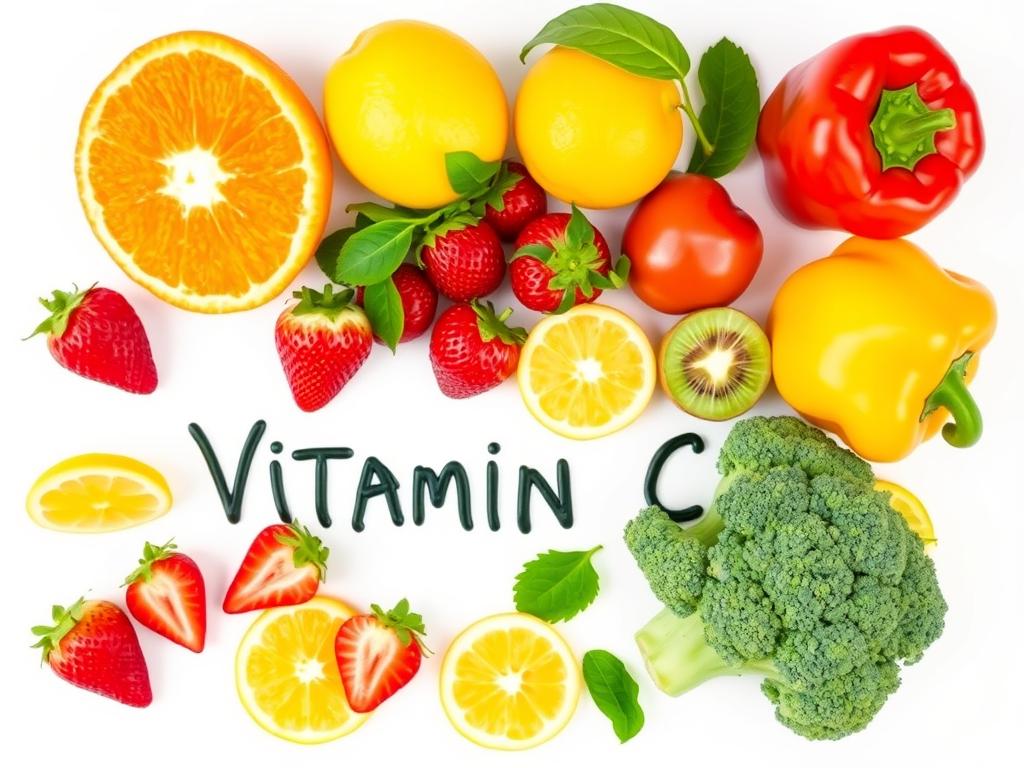
Vitamin C is crucial for collagen synthesis as it helps link amino acids together during collagen production. Without adequate vitamin C, your body simply cannot form collagen properly.
- Citrus fruits (oranges, lemons, grapefruits)
- Bell peppers (especially red and yellow varieties)
- Strawberries, kiwi, and other berries
- Broccoli and Brussels sprouts
- Tropical fruits like mango, papaya, and guava
Just one medium orange provides about 70mg of vitamin C, while a cup of strawberries offers around 85mg – both exceeding the daily recommended intake of 65-90mg.
Amino Acid Sources
Collagen is made up of specific amino acids, particularly glycine, proline, and lysine. While animal products contain these in forms readily used for collagen, plant foods can also provide these essential building blocks:
- Legumes (beans, lentils, chickpeas) – rich in lysine
- Tofu, tempeh, and edamame – complete protein sources
- Spirulina and chlorella – contain all essential amino acids
- Pumpkin, sunflower, and chia seeds – good sources of glycine
- Nuts, especially peanuts and cashews – contain proline
Zinc and Copper Sources
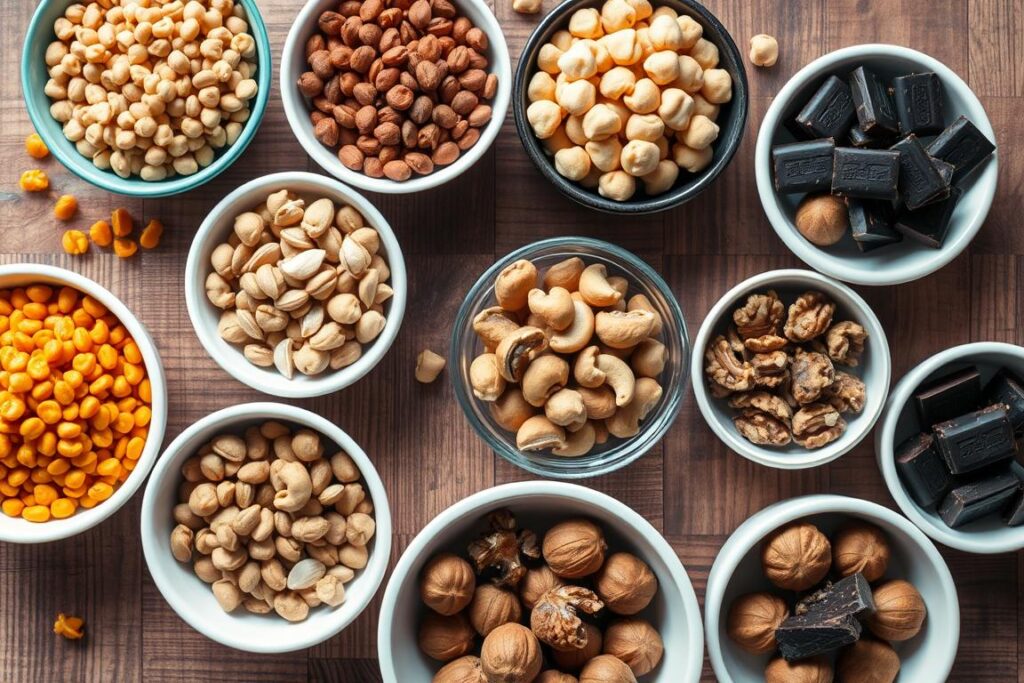
These minerals act as cofactors in collagen synthesis, helping enzymes do their job in creating and stabilizing collagen fibers:
- Pumpkin seeds – exceptionally high in zinc
- Cashews and other nuts – good sources of both zinc and copper
- Chickpeas and lentils – provide steady amounts of zinc
- Sesame seeds – rich in copper
- Dark chocolate (70%+ cacao) – contains both minerals
Sulfur-Rich Foods
Sulfur is essential for collagen cross-linking, which gives collagen its strength:
- Garlic and onions – high in sulfur compounds
- Cruciferous vegetables (broccoli, cabbage, cauliflower)
- Asparagus – contains sulfur and antioxidants
- Mustard greens and kale – nutrient-dense options
Antioxidant-Rich Foods
Antioxidants protect existing collagen from damage by neutralizing free radicals:
- Berries (blueberries, blackberries, goji berries)
- Dark leafy greens (spinach, kale)
- Colorful vegetables (purple cabbage, red bell peppers)
- Green tea – contains powerful catechins
- Herbs and spices (turmeric, cinnamon, oregano)
Collagen-Boosting Vegan Recipes
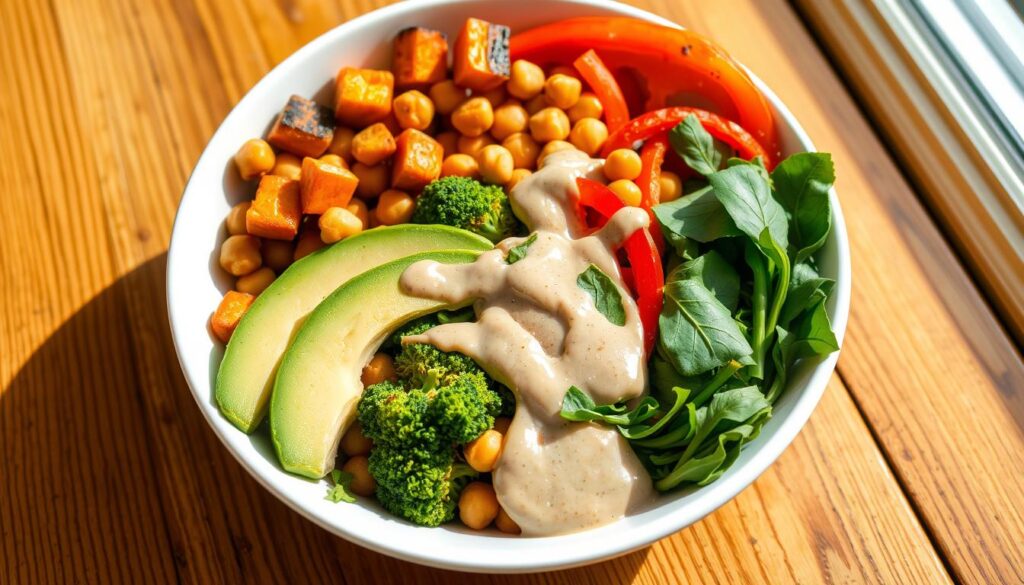
Collagen-Boosting Buddha Bowl
This nutrient-packed bowl combines multiple collagen-supporting ingredients in one delicious meal.
Ingredients:
- 1 cup steamed broccoli
- ½ cup roasted chickpeas
- ½ avocado, sliced
- ½ cup sliced red bell pepper
- ¼ cup pumpkin seeds
- 2 cups mixed leafy greens
- Lemon-tahini dressing (2 tbsp tahini, 1 tbsp lemon juice, water to thin)
Why it works: This bowl provides vitamin C (bell peppers, broccoli), amino acids (chickpeas), zinc and copper (pumpkin seeds), and healthy fats (avocado) to support collagen production.
Antioxidant Berry Smoothie
Start your day with this collagen-supporting smoothie packed with vitamin C and antioxidants.
Ingredients:
- 1 cup mixed berries (strawberries, blueberries)
- 1 kiwi, peeled
- 1 tbsp chia seeds
- 1 cup spinach
- 1 tbsp spirulina powder (optional)
- 1 cup plant milk
- Ice as needed
Why it works: The berries and kiwi provide abundant vitamin C, while spirulina adds amino acids and chia seeds contribute omega-3 fatty acids that support skin health.
Lentil-Stuffed Bell Peppers
These stuffed peppers combine multiple collagen-boosting ingredients in one satisfying dish.
Ingredients:
- 4 large bell peppers (any color), halved and seeded
- 1 cup cooked lentils
- 1 cup cooked quinoa
- 1 onion, diced
- 3 garlic cloves, minced
- 1 cup spinach, chopped
- 2 tbsp tomato paste
- 1 tsp each: cumin, paprika, oregano
- ¼ cup nutritional yeast
Why it works: Bell peppers provide vitamin C, lentils offer protein and zinc, garlic adds sulfur compounds, and spinach contributes antioxidants.
“The nutrients in plant foods work synergistically to support collagen production. It’s not about any single food but rather the combination of various nutrients that creates the optimal environment for collagen synthesis.”
Lifestyle Practices That Boost Collagen
Beyond diet, several lifestyle factors significantly impact your body’s ability to produce and maintain collagen. Implementing these practices can enhance your natural collagen production and protect existing collagen from damage.
Stress Reduction Techniques

Chronic stress triggers inflammation and releases cortisol, which can break down collagen. Managing stress is therefore crucial for maintaining healthy collagen levels:
- Daily meditation (even 10 minutes can help)
- Yoga practice (particularly restorative styles)
- Deep breathing exercises (try the 4-7-8 technique)
- Forest bathing or nature walks
- Journaling to process emotions
Pro Tip: Research published in the Journal of Clinical and Aesthetic Dermatology shows that chronic stress accelerates skin aging by increasing inflammation and reducing collagen production.
Sleep Optimization
Your body repairs and regenerates collagen during deep sleep. Poor sleep quality directly impacts collagen production:
- Aim for 7-9 hours of quality sleep nightly
- Maintain a consistent sleep schedule
- Create a dark, cool sleeping environment
- Avoid screens 1-2 hours before bedtime
- Consider a silk pillowcase to reduce friction on skin
Sun Protection
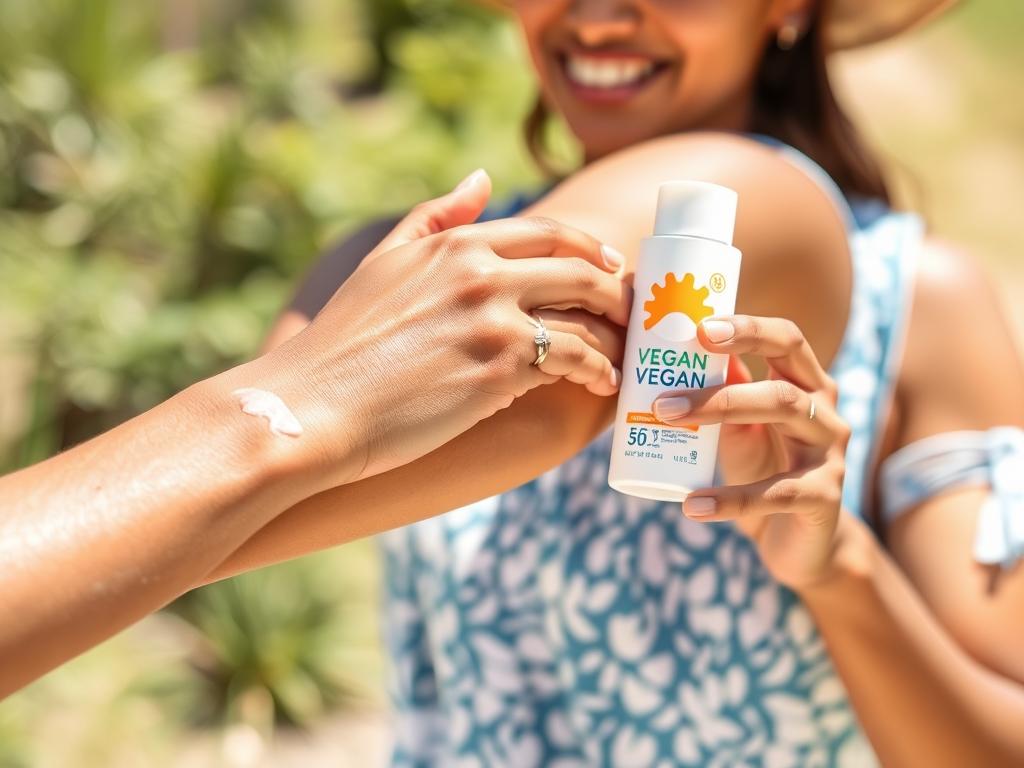
UV radiation is one of the primary causes of collagen degradation. Protecting your skin from sun damage is essential:
- Apply broad-spectrum SPF 30+ sunscreen daily (even on cloudy days)
- Wear protective clothing, wide-brimmed hats, and sunglasses
- Seek shade during peak sun hours (10am-4pm)
- Consider UPF-rated clothing for extended outdoor activities
Vegan sunscreen options include:
- Pacifica Mineral Face Shade (zinc oxide-based)
- Sun Bum Original SPF 50 (certified vegan)
- Supergoop! Unseen Sunscreen (plant-based formula)
Exercise for Collagen Production
Regular physical activity stimulates collagen synthesis in connective tissues:
- Strength training (2-3 times weekly)
- Low-impact activities like swimming or cycling
- Facial yoga to stimulate collagen in facial muscles
- Stretching to maintain collagen elasticity
“Exercise creates mechanical stress that signals fibroblasts to produce more collagen. Even moderate exercise has been shown to improve skin structure and slow age-related changes.”
Natural Topical Routines for Collagen Support
While topically applied collagen molecules are too large to penetrate the skin, certain plant-based ingredients can stimulate collagen production when applied externally.
Effective Vegan Ingredients
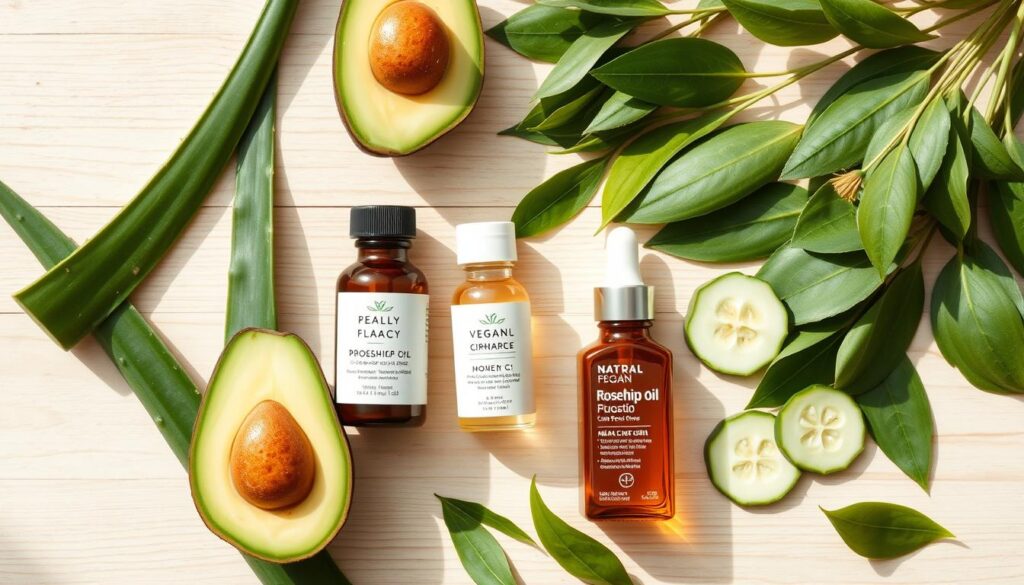
- Vitamin C serums – stimulate fibroblasts to produce collagen
- Aloe vera – contains compounds that boost collagen synthesis
- Plant peptides – signal skin to produce more collagen
- Rosehip oil – rich in vitamins A and C
- Green tea extract – protects existing collagen from damage
- Bakuchiol – plant-based retinol alternative
DIY Vegan Collagen-Boosting Masks
Vitamin C Brightening Mask
Ingredients:
- 2 tbsp fresh orange or lemon juice
- 1 tbsp aloe vera gel
- 1 tsp vitamin E oil
Directions: Mix ingredients, apply to clean skin for 15 minutes, then rinse with cool water. Use weekly.
Benefits: Vitamin C stimulates collagen production, aloe soothes and hydrates, while vitamin E protects from oxidative damage.
Avocado-Cucumber Hydrating Mask
Ingredients:
- ½ ripe avocado, mashed
- ¼ cucumber, pureed
- 1 tsp lemon juice
- 1 tsp olive oil
Directions: Blend ingredients until smooth, apply to face for 20 minutes, then rinse. Use twice weekly.
Benefits: Avocado provides essential fatty acids and vitamins, cucumber hydrates and reduces inflammation, while lemon adds vitamin C.
Facial Massage Techniques

Facial massage stimulates circulation and may help boost collagen production:
- Gua sha – use a flat jade or rose quartz tool to gently scrape along facial contours
- Facial rolling – use a jade or rose quartz roller in upward and outward motions
- Fingertip tapping – gently tap around eyes, forehead, and jawline
- Knuckle circles – use knuckles to make small circular motions on cheeks and forehead
Pro Tip: Always apply a facial oil before massage to reduce friction. Perform these techniques for 5-10 minutes daily for best results.
Science-Backed Habits for Collagen Protection
Research has identified several lifestyle factors that can either protect or damage your body’s collagen. Understanding these can help you make informed choices for long-term skin health.
Habits to Avoid
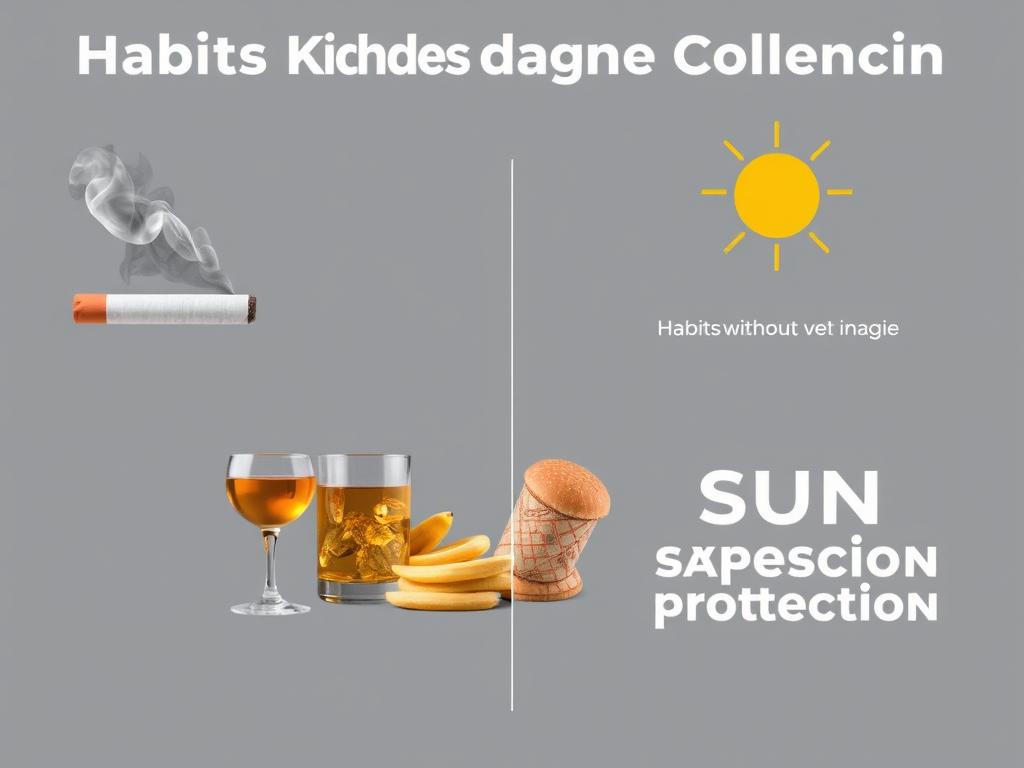
Certain lifestyle factors actively break down collagen and inhibit new production:
- Smoking – reduces collagen production and damages existing fibers
- Excessive alcohol – dehydrates skin and triggers inflammation
- High sugar consumption – causes glycation that stiffens collagen
- Unprotected sun exposure – UV radiation breaks down collagen
- Pollution exposure – free radicals damage skin structure
A study published in the Journal of Clinical and Aesthetic Dermatology found that smokers have significantly less collagen in their skin compared to non-smokers, with visible differences in skin elasticity and wrinkle formation.
Hydration Strategies
Proper hydration is essential for optimal collagen function:
- Drink at least 8-10 glasses of water daily
- Consume water-rich fruits and vegetables
- Limit caffeine and alcohol, which can dehydrate
- Consider adding lemon or cucumber to water for added benefits
- Track hydration with apps or marked water bottles
Antioxidant-Rich Herbal Teas
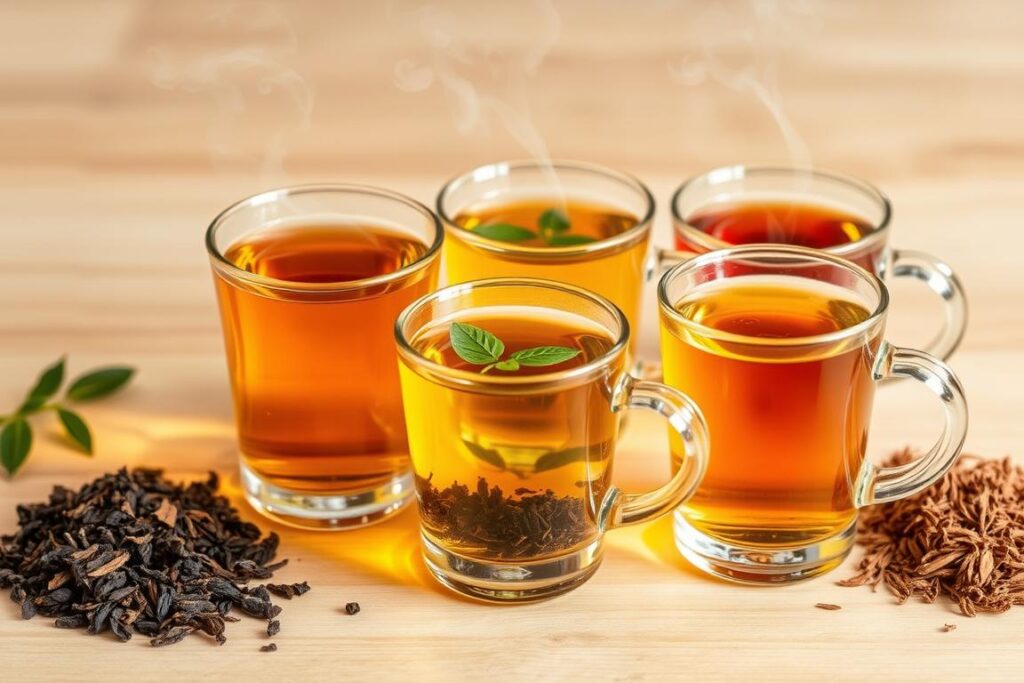
Certain herbal teas contain compounds that protect and support collagen:
- Green tea – rich in catechins that protect collagen
- White tea – contains compounds that inhibit enzymes that break down collagen
- Hibiscus tea – high in vitamin C and anthocyanins
- Rooibos tea – contains antioxidants that fight free radicals
- Nettle tea – provides silica that supports collagen structure
Research published in the Journal of Nutrients shows that the polyphenols in green tea can protect skin from UV damage and improve elasticity by supporting collagen structures.
Frequently Asked Questions

Can vegans produce enough collagen without animal products?
Yes, absolutely. While vegans don’t consume pre-formed collagen from animal sources, the human body naturally produces its own collagen when given the right nutrients. A well-planned vegan diet rich in vitamin C, zinc, copper, and plant proteins provides all the building blocks needed for collagen synthesis. In fact, focusing on these nutrients can be more effective than consuming collagen directly, as ingested collagen is broken down during digestion rather than being directly incorporated into your skin.
How long until I see results from natural collagen-boosting methods?
Natural approaches to boosting collagen require consistency and patience. Most people begin to notice improvements in skin elasticity, hydration, and texture after 4-12 weeks of consistent dietary and lifestyle changes. However, factors like age, starting skin condition, and how comprehensively you implement these practices will affect your timeline. Remember that preventing collagen loss is easier than rebuilding it, so these practices are valuable even if visible results take time.
Are there any vegan foods that contain collagen?
No plant foods naturally contain collagen, as collagen is a protein specific to animals. However, plants contain all the nutrients needed to build collagen. Some food companies now offer “plant collagen builders” or “vegan collagen boosters,” which are formulations of nutrients that support your body’s natural collagen production. These typically contain ingredients like vitamin C, silica, amino acids, and antioxidants – all derived from plants.
Can topical products really increase collagen?
Topical products cannot add collagen directly to your skin, as collagen molecules are too large to penetrate the skin barrier. However, certain ingredients like vitamin C, retinoids (or plant-based alternatives like bakuchiol), peptides, and growth factors can stimulate your skin’s fibroblasts to produce more collagen naturally. For vegans, look for products with plant-derived peptides, vitamin C, niacinamide, and botanical extracts that have been shown to support collagen production.
Is it possible to rebuild collagen that’s already been lost?
Yes, to some extent. While severe collagen loss may not be completely reversible through natural methods alone, research shows that the body can increase collagen production at any age when given the right nutrients and stimulation. Consistency is key – combining a nutrient-rich diet, proper hydration, sun protection, adequate sleep, stress management, and targeted skincare can significantly improve collagen levels over time, even after previous loss.
Conclusion: Your Vegan Collagen-Boosting Journey
Boosting collagen production naturally on a vegan diet is not only possible but can be highly effective when approached holistically. By focusing on nutrient-rich foods, protective lifestyle practices, and targeted topical treatments, you can support your body’s natural collagen synthesis without relying on animal-derived supplements.
Remember that consistency is key – collagen production is a continuous process that responds to the cumulative effect of your daily choices. Small, sustainable changes implemented over time will yield better results than short-term extreme measures.
By embracing these vegan-friendly approaches to increase collagen production naturally, you’re not only supporting healthier skin, joints, and connective tissues but also aligning your beauty and wellness routines with your ethical choices.
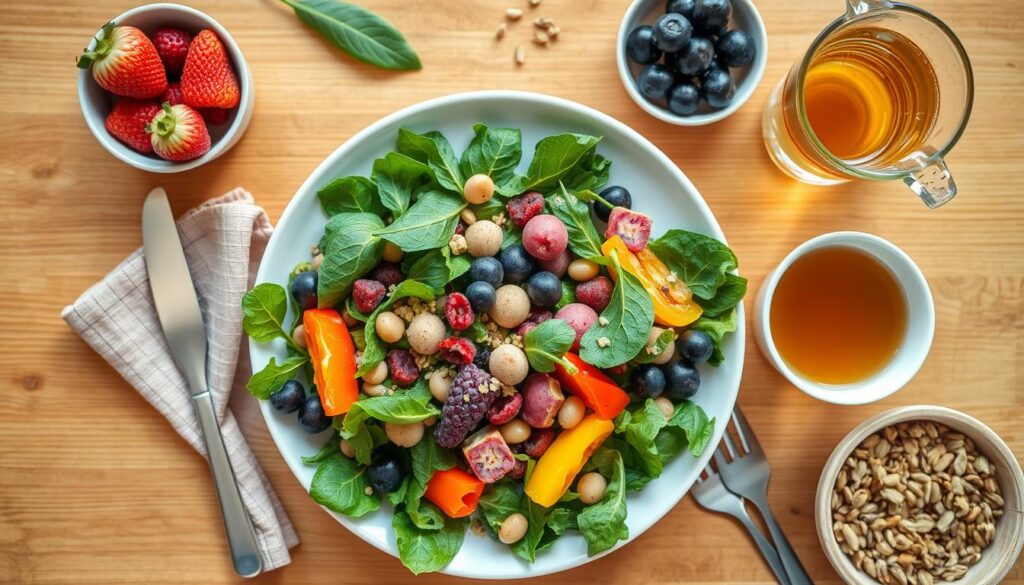
Ready to Boost Your Collagen Naturally?
Download our free 7-day vegan collagen-boosting meal plan with shopping lists, recipes, and daily tips to jumpstart your natural collagen production.


hi zee
superb information you share.
thanks
[…] to uncover how dietary patterns influence our body’s protein factories. Food scientists and nutrition experts now recognize two distinct pathways for supporting structural proteins: direct intake from […]
[…] Vegans often lack direct sources of EPA and DHA, essential for cognitive and cardiovascular health […]